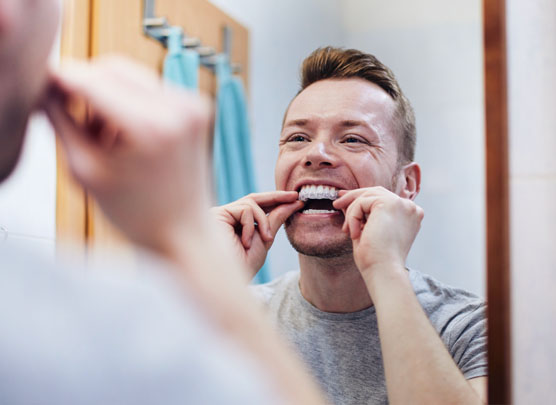Custom-made sports guards keep your teeth safe from injury. They fit comfortably without slipping to provide the best protection for your teeth.

Why do I need to protect my teeth with a sports guard?
Your teeth can be injured or damaged by impacts to your face or by grinding and clenching. If they aren’t protected from damage, your teeth could be damaged or lost, or they could become misaligned. Guards and appliances provide a layer of protection to keep your teeth safe and healthy and your smile beautiful.
Imagine what it would be like if you suddenly lost one or two of your front teeth. Smiling, talking, eating—everything—would suddenly be affected. Preventing injuries to your mouth and face is especially important if you participate in organized sports or other recreational activities.
Sports guards, also called mouthguards, typically cover the upper teeth and help cushion a blow to the face, minimizing the risk of broken teeth and injuries to your lips, tongue, face or jaw.
When should you wear a mouthguard?
When it comes to protecting your mouth, a mouthguard is an essential piece of athletic gear that should be part of your standard equipment from an early age.
While collision and contact sports, such as boxing, are higher-risk sports for the mouth, any athlete may experience a dental injury in non-contact activities too, such as gymnastics and skating.
Types of mouthguards
For the best fit and comfort, the ideal mouthguard is one that has been custom made by our office for your mouth. Custom sports guards are worn over the teeth to absorb impacts and protect your teeth from being injured.
Mouthguard care
When not in use, it’s important to keep your mouthguard clean and dry.
- Rinse before and after each use, brush with a toothbrush and toothpaste, or clean with soapy water. Then, rinse it and dry it thoroughly.
- Dry your mouthguard and store the mouthguard in a sturdy container that has vents to keep bacteria from growing.
- Never leave the mouthguard in the sun or in hot water.
- During your regular dental checkups, bring your mouthguard so that we can give it a thorough cleaning.
Mouthguard replacement
Consult with us to determine when to replace your mouthguard, but replace it immediately if it shows sign of wear, is damaged or is ill-fitting. Teens and children may need to replace their mouthguards more often because their mouths are still growing and changing.
Frequently asked questions
Do I need a guard if I don’t play contact sports?
Yes, your teeth can be injured by even a minor impact. You should wear a guard for any sport where there is a risk of impact to your mouth or of falling.
How can I tell if my sports guard fits me?
Remember to bring your mouthguard with you to your regular dental check-ups so that we can be sure that the mouthguard continues to fit correctly. Your sports guard should fit comfortably and allow you to speak and breathe easily. You should not have to bite the guard to keep it in place. If your guard doesn’t fit properly, speak to us about getting the guard adjusted or replaced.


